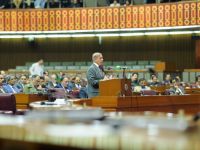The United States signaled Monday it would be willing to consider Palestinian appeals for an international force to patrol the West Bank and Gaza, backing off from an earlier categorical rejection of the idea.
The change, communicated subtly in public comments at the White House and State Department and enunciated more clearly in private, comes as Palestinian leader Yasser Arafat and Israeli Prime Minister Ehud Barak prepare to visit Washington for separate talks with US President Bill Clinton.
"There is a slight shift from Friday," a senior State Department official told AFP, referring to the sharp US opposition to such a force registered last week during a visit here by senior Palestinian negotiator Saeb Erekat.
Erekat had been pushing the idea ahead of Arafat's trip to Washington this Thursday.
"We'll hear them out," the official said of the Palestinian request.
He stressed, however, that the United States would not support anything that Israel did not want and that Washington did not believe that the United Nations should be involved in.
"I can't speculate about what might be acceptable, but we're not looking for a UN resolution or anything within the UN system," the official said. "We're prepared to look at something different."
The Palestinians have been pushing hard for a UN force of 2,000 military observers, and the Security Council is expected to take up a draft proposal for one on Wednesday.
On Sunday, Arafat renewed the call, telling CBS television's "60 Minutes" program that the force was needed "to protect us, to stop attacks against our people" by Israeli troops.
Citing an Israeli source, the Jerusalem Post reported Monday that Washington was floating a proposal for an unarmed force that would have observer status similar to that of a group organized after a mosque massacre in Hebron in 1994.
That force, the Temporary International Presence in Hebron, is composed of 30 Norewegians.
The senior State Department official declined to comment on the report.
At the White House, spokesman Jake Siewert studiously refused to address the issue, though he would not confirm or deny its substance.
"I'm not going to discuss what we may or may not be exploring with the parties," Siewert told reporters. "I'm not going to discuss negotiating stances here at this podium."
State Department spokesman Richard Boucher, who on Friday had flatly ruled out any kind of international protective presence for the Palestinians, stepped back from that stance, saying only that Washington was not in favor of UN force.
"I think we've made quite clear, we don't think that this is the moment for more UN resolutions," Boucher told reporters.
He and Siewert stressed that the top US priority was to press the Israelis and Palestinians to implement agreements made last month at the Sharm el-Sheikh summit aimed at ending the ongoing violence that has killed some 180 people, most of them Palestinians.
"I think, before we go looking for new ideas, it's important to implement the steps at Sharm el-Sheikh and to carry out the commitments that the parties have made already," he said.
But on Friday, Boucher had ruled out the international force idea.
"The United States has consistently had reservations or been opposed to these proposals," he said then, maintaining that the best way for peace to be restored was to rely on the two parties and not on foreign players.
Erekat himself said the concept had not met with "much enthusiasm" from either US Secretary of State Madeleine Albright or National Security Adviser Samuel Berger -- WASHINGTON (AFP)
© 2000 Al Bawaba (www.albawaba.com)







